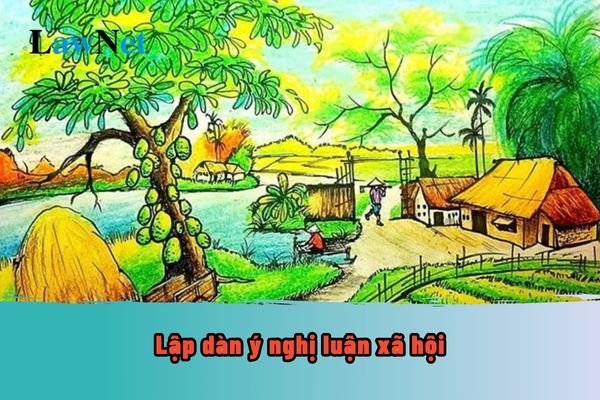What are the guidelines for preparing the outline for a social argumentative essay on an ideology/moral principle in Vietnam? What does the text corpus of the 8th-grade Literature curriculum include?
What are the guidelines for preparing the outline for a social argumentative essay on an ideology/moral principle in Vietnam?
8th-grade students can refer to the following guidelines for preparing the outline for a social argumentative essay on an ideology/moral principle in Vietnam:
|
Guidelines for preparing the outline for a social argumentative essay on an ideology/moral principle I. Introduction: |
*Note: The information is for reference only./.

What are the guidelines for preparing the outline for a social argumentative essay on an ideology/moral principle in Vietnam? What does the text corpus of the 8th-grade Literature curriculum include? (Image from the Internet)
What does the text corpus of the 8th-grade Literature curriculum in Vietnam include?
Under Sub-Section 2, Section 5 Circular 32/2018/TT-BGDDT, the text corpus of the 8th-grade Literature curriculum includes:
(1). Literary Texts
- Funny stories, short stories, historical stories
- Satirical poems, seven-word eight-line rhyme, four-word Tang law poems; six, seven-word poems
- Comedy
(2). Argumentative Texts
- Social argumentation
- Literary argumentation
(3). Informative Texts
- Expository texts explaining a natural phenomenon, texts introducing a book
- Petition texts
What are the required outcomes for the reading section in the 8th-grade Literature curriculum in Vietnam?
Under Section IV of the General Education Program in Literature issued with Circular 32/2018/TT-BGDDT, the required outcomes for the reading section in the 8th-grade Literature curriculum in Vietnam are as follows:
Literary Texts
Reading Comprehension of Content
- Identify the overarching content of the text; recognize key details, subject matter, stories, and characters within the integrity of the work.
- Recognize and analyze the theme, ideas, and messages the text aims to convey to the reader through artistic forms; analyze some bases for determining the theme.
- Identify and analyze the emotions, sentiments, and main inspiration of the writer expressed through the text.
Reading Comprehension of Form
- Identify and analyze the role of imagination in receiving literary texts.
- Recognize some elements of jokes, historical stories such as: plot, context, characters, language.
- Recognize and analyze single-threaded and multi-threaded plots.
- Recognize and analyze the effect of some main artistic techniques in satirical poetry.
- Recognize some poetic rules of seven-word eight-line poetry and Lu Shi quatrains such as: composition, rhyme, rhythm, meter, parallelism.
- Recognize and analyze the uniqueness of a poem represented through words, images, composition, emotional flow.
- Recognize and analyze some elements of comedy such as: conflict, action, characters, dialogue, satirical techniques.
Relation, Comparison, Connection
- Understand that each reader may have a unique approach to receiving a literary text; know how to respect and learn from others' approaches.
- Comment on the content reflected and the perspective on life, humans of the author in the literary text.
- State the changes in thoughts, emotions, or lifestyle of oneself after reading a literary work.
Extended Reading
- During one academic year, read a minimum of 35 literary texts (including texts guided for reading on the Internet) with a genre and length similar to the texts studied.
- Memorize some favorite verses or poems in the curriculum.
Argumentative Texts
Reading Comprehension of Content
- Recognize the thesis, arguments, reasoning, and key evidence in the text.
- Analyze the relationship between the thesis, arguments, reasoning, and evidence; the role of arguments, reasoning, and evidence in illustrating the thesis.
Reading Comprehension of Form
Differentiate objective reasoning, and verifiable evidence from the subjective opinions and evaluations of the writer.
Relation, Comparison, Connection
Link the content mentioned in the text to contemporary social issues.
Extended Reading
During one academic year, read a minimum of 9 argumentative texts (including texts guided for reading on the Internet) with a length similar to the texts studied.
Informational Texts
Reading Comprehension of Content
- Analyze the basic information of the text.
- Analyze the role of details in expressing the basic information of the text.
Reading Comprehension of Form
- Recognize and analyze the characteristics of some types of informational texts: texts explaining a natural phenomenon; texts introducing a book or movie; identify the relationship between the characteristics of the text and its purpose.
- Recognize and analyze the presentation of information in the text in terms of chronological order, cause-and-effect relations, the importance of the subject, or comparison and contrast methods.
Relation, Comparison, Connection
- Link the information in the text to contemporary social issues.
- Evaluate the effectiveness of a particular non-verbal means of expression in a specific text.
Extended Reading
During one academic year, read a minimum of 18 informational texts (including texts guided for reading on the Internet) with similar types and lengths to the texts studied.

